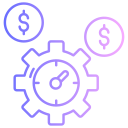Understand Your Attention: The Science Behind Focus
Attention is like a narrow beam controlled by your prefrontal cortex. Rapid task switching drains glucose, increases errors, and inflates completion time. Protecting this spotlight with deliberate choices is the foundation for improving focus with self-management skills.
Understand Your Attention: The Science Behind Focus
Self-management skills convert intention into behavior: clear goals reduce ambiguity, routines automate decisions, and environmental cues lower friction. Together, they transform focus from a fleeting mood into reliable, repeatable actions you can trust each day.







